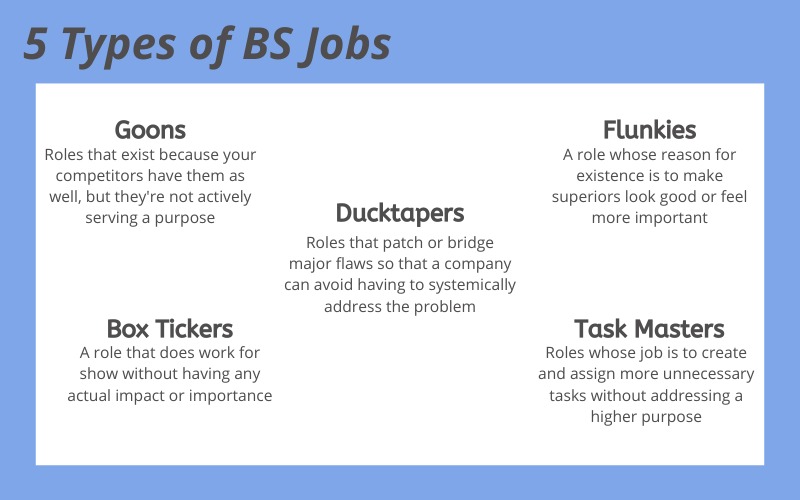Role Leverage
@tags:: #lit✍/📰️article/highlights
@links:: career guide, leverage,
@ref:: Role Leverage
@author:: Probably Good
=this.file.name

Reference
=this.ref
Notes
In the context of impactful jobs, leverage can be thought of as the total influence a role has on the impact the organization or company is trying to make. In other words, how much difference does this role make?
- View Highlight
-
(highlight:: Anthropologist David Graeber’s book Bullshit Jobs goes as far as indexing these sorts of jobs into a “typology of bullshit.” In it, he breaks down the five major types of jobs that may be a waste of time and resources.
 )
)
- View Highlight
-
(highlight:: As a result, the first step in determining a role’s leverage is to make sure it makes a difference. This often depends on the specific situation and organization, but you can gain some intuition by asking yourself:
• Would the organization still make progress without this role?
• Is this role central to what the organization does?
• How much will this role enable others to do important work?
• Does this role directly make an impact on the problem we’re solving? If not, how does it indirectly contribute to progress?)
- View Highlight
-
- [note::Some more great questions to keep in mind. In summary, does this role actually move the needle? Answering these questions requires one to be exceptionally honest with oneself, or risk taking a questionably impactful job because of other factors, like money or prestige.]
(highlight:: If you’re at the point of interviewing with specific organizations, another helpful way to gain a sense of a role’s importance is to simply ask them. It may be tricky to get an honest answer, but some strategic questions can help you gain a sense of what this role looks like within the organization’s structure and dynamic:
• How does this role impact the organization?
• What’s the difference between someone great at this role vs. just okay at it?
• What do the day-to-day activities of this position look like?
• What sort of dilemmas does this role deal with?)
- View Highlight
- questions/impact, questions/interview,
Sometimes a role is in the unique position to expand an organization’s reach or impact— like by opening up a new branch, extending services to a new region, or reaching a new audience/population, etc. Other times, it can enable some sort of growth within a field or cause area—like by improving the quality/scale of training, recruiting new people, fundraising, helping to automate certain processes, etc. In these scenarios, it’s easy to see how a role could have an outsized impact on the problem or goal.
- View Highlight
-
(highlight:: When it comes to a role’s leverage, we’re looking for any information that indicates:
- How this role meaningfully contributes to making an impact.
- If there are reasons the role could have uniquely high leverage.)
- View Highlight
-
dg-publish: true
created: 2024-07-01
modified: 2024-07-01
title: Role Leverage
source: reader
@tags:: #lit✍/📰️article/highlights
@links:: career guide, leverage,
@ref:: Role Leverage
@author:: Probably Good
=this.file.name

Reference
=this.ref
Notes
In the context of impactful jobs, leverage can be thought of as the total influence a role has on the impact the organization or company is trying to make. In other words, how much difference does this role make?
- View Highlight
-
(highlight:: Anthropologist David Graeber’s book Bullshit Jobs goes as far as indexing these sorts of jobs into a “typology of bullshit.” In it, he breaks down the five major types of jobs that may be a waste of time and resources.
 )
)
- View Highlight
-
(highlight:: As a result, the first step in determining a role’s leverage is to make sure it makes a difference. This often depends on the specific situation and organization, but you can gain some intuition by asking yourself:
• Would the organization still make progress without this role?
• Is this role central to what the organization does?
• How much will this role enable others to do important work?
• Does this role directly make an impact on the problem we’re solving? If not, how does it indirectly contribute to progress?)
- View Highlight
-
- [note::Some more great questions to keep in mind. In summary, does this role actually move the needle? Answering these questions requires one to be exceptionally honest with oneself, or risk taking a questionably impactful job because of other factors, like money or prestige.]
(highlight:: If you’re at the point of interviewing with specific organizations, another helpful way to gain a sense of a role’s importance is to simply ask them. It may be tricky to get an honest answer, but some strategic questions can help you gain a sense of what this role looks like within the organization’s structure and dynamic:
• How does this role impact the organization?
• What’s the difference between someone great at this role vs. just okay at it?
• What do the day-to-day activities of this position look like?
• What sort of dilemmas does this role deal with?)
- View Highlight
- questions/impact, questions/interview,
Sometimes a role is in the unique position to expand an organization’s reach or impact— like by opening up a new branch, extending services to a new region, or reaching a new audience/population, etc. Other times, it can enable some sort of growth within a field or cause area—like by improving the quality/scale of training, recruiting new people, fundraising, helping to automate certain processes, etc. In these scenarios, it’s easy to see how a role could have an outsized impact on the problem or goal.
- View Highlight
-
(highlight:: When it comes to a role’s leverage, we’re looking for any information that indicates:
- How this role meaningfully contributes to making an impact.
- If there are reasons the role could have uniquely high leverage.)
- View Highlight
-